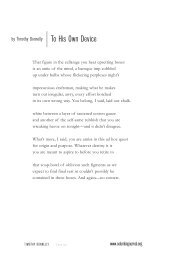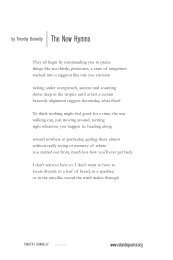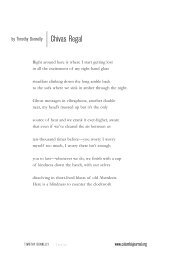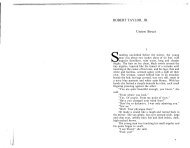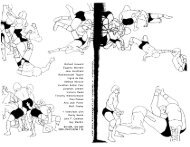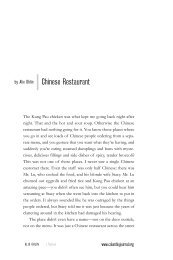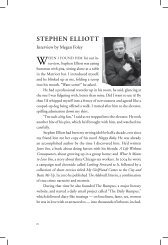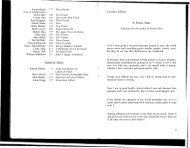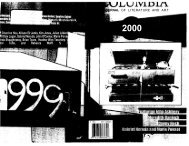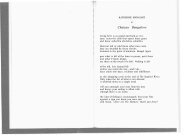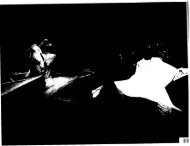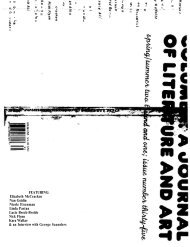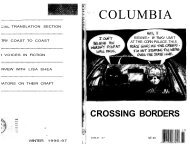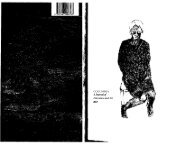Issue 42 - Columbia: A Journal of Literature and Art
Issue 42 - Columbia: A Journal of Literature and Art
Issue 42 - Columbia: A Journal of Literature and Art
You also want an ePaper? Increase the reach of your titles
YUMPU automatically turns print PDFs into web optimized ePapers that Google loves.
c: How did that last transition occur?<br />
AB: I was on my way to becoming a psychoanalyst. I had a meeting<br />
with the guy who was going to be my training analyst; we had a very<br />
nice chat. As I was coming home I drove past Wesleyan University,<br />
which is where I'd gone to college, <strong>and</strong> I remembered how I had bartended<br />
an event at the President's house when I was an undergraduate.<br />
I remembered all these old guys sitting on the settee - 95-year-old<br />
alums - <strong>and</strong> I thought it would be so funny if one <strong>of</strong> them just died.<br />
That led to the idea for a mystery. My kids had left their McDonald's<br />
hamburger boxes in the front seat, so I wrote some notes on the hamburger<br />
boxes. When I got home I took out my little Olivetti typewriter<br />
<strong>and</strong> I had about 15 pages <strong>of</strong> story <strong>and</strong> I was like, Oh look at that, story!<br />
I guess I'll do that for a while. So I called the guy who was going to be<br />
my analyst <strong>and</strong> said, "You know, it looks like I have something else to<br />
do." So then I started writing this mystery, which I was probably<br />
drawn to because I understood the conventions <strong>of</strong> a mystery - I wasn't<br />
very good at them, but I understood them. And then the short stories<br />
started showing up, so I wrote them. The very first story I wrote<br />
I don't even remember the name <strong>of</strong> it, it's in Come to Me, when Galen is<br />
in love with Henry <strong>and</strong> decides not to leave her husb<strong>and</strong> David. That<br />
["The Sight <strong>of</strong> You"] is the first story I ever wrote. And the second<br />
story was "Love Is Not a Pie," which got published, <strong>and</strong> the third story<br />
I wrote was "Silver Water."<br />
C: How should a story balance showing <strong>and</strong> telling?<br />
AB: In a short story, you don't want to shortchange yourself. You don't<br />
want to not have the great narrative moments, but still you want to<br />
make most things happen right in front <strong>of</strong> the eyes <strong>of</strong> the reader. I<br />
don't think any story is interesting unless more than one story is being<br />
told. Otherwise it's missing the great thing that Will Durant said <br />
that history is the lives lived on the riverbanks, the fire, the children<br />
born, the old people who die, meals made, people making love, people<br />
doing laundry, <strong>and</strong> the river <strong>of</strong> blood that runs between the banks <strong>of</strong><br />
the river, which is famine <strong>and</strong> war <strong>and</strong> catastrophe <strong>and</strong> cruelty. You<br />
can't tell the history about the lives on the riverbanks <strong>and</strong> the river<br />
without these.<br />
C: At some point when you're writing about the riverbank <strong>and</strong> the<br />
river, do you feel a story becomes its own story?<br />
AB: It does become its own story. You leap <strong>of</strong>f from the characters or the<br />
impulse or the moment in your own real life. I feel perfectly capable <strong>of</strong><br />
getting my point across in real life without resorting to fiction. I don't<br />
think a lot <strong>of</strong> people don't know what I think. So why would I have to<br />
put it on the page if it's going to mess up the novel? Things can creep<br />
into your fiction but by <strong>and</strong> large, I would rather protect my family.<br />
C: In "Love Is Not a Pie," you begin with the narrator at her mother's<br />
funeral <strong>and</strong> then go back to the summer when, as a teenager, she discovers<br />
the dynamics <strong>of</strong> her parents' relationship, which happens to<br />
include a lover. Why do you think it's important to have a reason to<br />
set the reminiscence in motion in a story in which much <strong>of</strong> the narrative<br />
is told in flashback?<br />
AB: I think that story began with the opening line <strong>and</strong> emerged in my<br />
head in the present. And there were two points <strong>of</strong> view I could tell the<br />
story from. I could tell it from the woman having the affair, but she's<br />
either going to be indifferent to the pain she's causing or she's going to<br />
need a lot <strong>of</strong> self-justification. Whereas a kid for whom life is idyllic<br />
<strong>and</strong> turns out to be much more complicated, that is more interesting to<br />
me. I've always been interested in how we try to make sense <strong>of</strong> what<br />
we've seen - where what we see is not what we thought we saw.<br />
What people do in response to the event is how you know who they<br />
are. It's never the event. Four people get hit by a bus - one <strong>of</strong> them is<br />
going to be in a wheelchair, one is going to walk away unharmed, one<br />
is going to walk away unharmed but be so psychologically struck he'll<br />
be in a wheelchair, <strong>and</strong> somebody else will take it as a sign from God<br />
that they should go become a priest. It's not the bus hitting you, it's<br />
what people do in response. II



